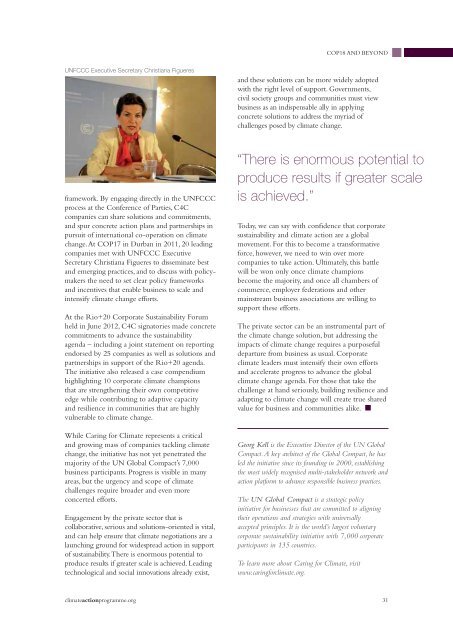Climate Action 2012-2013
You also want an ePaper? Increase the reach of your titles
YUMPU automatically turns print PDFs into web optimized ePapers that Google loves.
COP18 AND BEYOND<br />
UNFCCC Executive Secretary Christiana Figueres<br />
and these solutions can be more widely adopted<br />
with the right level of support. Governments,<br />
civil society groups and communities must view<br />
business as an indispensable ally in applying<br />
concrete solutions to address the myriad of<br />
challenges posed by climate change.<br />
framework. By engaging directly in the UNFCCC<br />
process at the Conference of Parties, C4C<br />
companies can share solutions and commitments,<br />
and spur concrete action plans and partnerships in<br />
pursuit of international co-operation on climate<br />
change. At COP17 in Durban in 2011, 20 leading<br />
companies met with UNFCCC Executive<br />
Secretary Christiana Figueres to disseminate best<br />
and emerging practices, and to discuss with policymakers<br />
the need to set clear policy frameworks<br />
and incentives that enable business to scale and<br />
intensify climate change efforts.<br />
At the Rio+20 Corporate Sustainability Forum<br />
held in June <strong>2012</strong>, C4C signatories made concrete<br />
commitments to advance the sustainability<br />
agenda – including a joint statement on reporting<br />
endorsed by 25 companies as well as solutions and<br />
partnerships in support of the Rio+20 agenda.<br />
The initiative also released a case compendium<br />
highlighting 10 corporate climate champions<br />
that are strengthening their own competitive<br />
edge while contributing to adaptive capacity<br />
and resilience in communities that are highly<br />
vulnerable to climate change.<br />
While Caring for <strong>Climate</strong> represents a critical<br />
and growing mass of companies tackling climate<br />
change, the initiative has not yet penetrated the<br />
majority of the UN Global Compact’s 7,000<br />
business participants. Progress is visible in many<br />
areas, but the urgency and scope of climate<br />
challenges require broader and even more<br />
concerted efforts.<br />
Engagement by the private sector that is<br />
collaborative, serious and solutions-oriented is vital,<br />
and can help ensure that climate negotiations are a<br />
launching ground for widespread action in support<br />
of sustainability. There is enormous potential to<br />
produce results if greater scale is achieved. Leading<br />
technological and social innovations already exist,<br />
“There is enormous potential to<br />
produce results if greater scale<br />
is achieved.”<br />
Today, we can say with confidence that corporate<br />
sustainability and climate action are a global<br />
movement. For this to become a transformative<br />
force, however, we need to win over more<br />
companies to take action. Ultimately, this battle<br />
will be won only once climate champions<br />
become the majority, and once all chambers of<br />
commerce, employer federations and other<br />
mainstream business associations are willing to<br />
support these efforts.<br />
The private sector can be an instrumental part of<br />
the climate change solution, but addressing the<br />
impacts of climate change requires a purposeful<br />
departure from business as usual. Corporate<br />
climate leaders must intensify their own efforts<br />
and accelerate progress to advance the global<br />
climate change agenda. For those that take the<br />
challenge at hand seriously, building resilience and<br />
adapting to climate change will create true shared<br />
value for business and communities alike. <br />
Georg Kell is the Executive Director of the UN Global<br />
Compact. A key architect of the Global Compact, he has<br />
led the initiative since its founding in 2000, establishing<br />
the most widely recognised multi-stakeholder network and<br />
action platform to advance responsible business practices.<br />
The UN Global Compact is a strategic policy<br />
initiative for businesses that are committed to aligning<br />
their operations and strategies with universally<br />
accepted principles. It is the world’s largest voluntary<br />
corporate sustainability initiative with 7,000 corporate<br />
participants in 135 countries.<br />
To learn more about Caring for <strong>Climate</strong>, visit<br />
www.caringforclimate.org.<br />
climateactionprogramme.org 31












